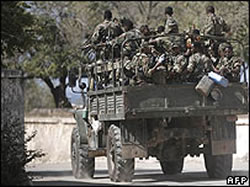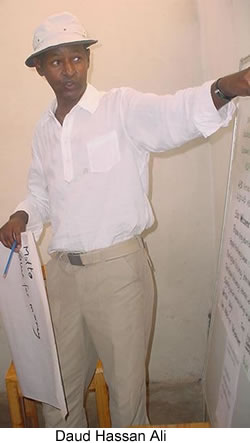fiogf49gjkf0d
by Dr. Ali Said Faqi
Sunday, April 27, 2008
 |
| Amnesty International accused Ethiopian Army killing civilians in Mogadishu |
Amnesty international has accused Ethiopian Army of deliberately killing civilians in Mogadishu. In its statement Amnesty international said that Ethiopian forces killed at least 21 people, including 11 unarmed civilians inside the mosque, and detained at least 40 children and youths, aged 9 to 18. At least 10 others were killed by Ethiopian forces in the vicinity of the mosque.
This barbaric execution allegedly committed by the Ethiopian army and the subsequent state of denial of the Ethiopian Government accusing Amnesty International of fabricating its report is appalling. Amnesty's global mission is rooted in a fundamental commitment to the rights, dignity, and well-being of every person on Earth (see Amnestyinternational.org). Since its inception it has developed a reliable track record of remaining neutral in any conflict and has no reason to fabricate its recent findings against Ethiopian army.
It is as well appalling the incessant execution of innocent people deliberately carried out by the groups opposing the TFG and the Ethiopian presence in Somalia. Two weeks ago two British teachers of Somali origin named Daud Hassan Ali and Rohana Ahmed have been shot dead in Beletweyne after Islamic insurgents targeted their school. The two Briton were killed alongside two Kenyans and one Somali national. These individuals were educators that did nothing wrong, but were executed by young men who unfortunately know only how to kill. We witness almost on a daily basis a Somali child becoming orphan; a wife turned into a widow; parents losing their loved child. No one seems to be doing anything to stop this vicious cycle and the desperate public appears to have accepted as if it is normal. After 18 years of violence one may ask himself is the Somali society overall going insane. May be it is a serious neuritis that is spreading a severe form of sadism in the community. If execution is the modus operandi of the groups in the conflict; this will make peace a far fetched dream. There is a high risk that the very few qualified people remaining in the country will be exterminated sooner or later. Imagine the feeling of living in a country where killing is much easier than earning a loaf of bread; life has no value at all.
 The conflict in Somalia has been dragged to a new and deceitful phase which will threaten the existence of millions of Somali people. There is no hope that the warring factions will ever resolve their disputes in a peaceful manner as they only speak one language, which is war. It is regrettable to see that after 18 years of civil war and destructions, rival groups are still thirsty of more bloodshed. To understand this whole conflict requires a deeper look of the history of the Somali tribes who are the actors of this pandemonium. Although the fight over the control of resources in Somalia is one of the major cause of the war; however, the deeply rooted centaury old hatred between these two clans is making the disagreements irresolvable and have turned the country ungovernable.
The conflict in Somalia has been dragged to a new and deceitful phase which will threaten the existence of millions of Somali people. There is no hope that the warring factions will ever resolve their disputes in a peaceful manner as they only speak one language, which is war. It is regrettable to see that after 18 years of civil war and destructions, rival groups are still thirsty of more bloodshed. To understand this whole conflict requires a deeper look of the history of the Somali tribes who are the actors of this pandemonium. Although the fight over the control of resources in Somalia is one of the major cause of the war; however, the deeply rooted centaury old hatred between these two clans is making the disagreements irresolvable and have turned the country ungovernable.
With rising food prices worldwide; the increasing insecurity throughout the country and lack of rain for the GU’ season; Somalia will face the worst humanitarian crises ever. If the future of those living in the country is so bleak, the life of thousands of Somali refugees worldwide is hopeless. Heat, dust, sand and wind dominate the lives of around 9,000 Somalis who have sought refuge in Yemen wrote Hans Andringa from radio Nederland on March 9, 2008. It is the apathy of the war monger leaders that wanes any hope for this nation. The humanitarian crisis in Somalia is a clear evidence of the abysmal failure of the Somali people in large and the international community as well.
Overall African civil wars have left physical and psychological scars in the lives of millions of people. A woman in Sierra Leone recalls that “rebels cut off my hand on Jan. 22, 1999 in the capital, Freetown”. She said they put my left hand on a table and chopped it off with a machete. I begged for mercy and asked them to think of God. They told me to point to God with my right hand and they tried to chop that off, too. Likewise, the 11 unarmed civilians inside the mosque killed by the Ethiopian army did nothing wrong, but their fate was decided by an African army who is trained to kill.
There is a remarkable similarity between Somali and Lebanese conflict. Lebanon of the late 1960’s was known as the Switzerland of the Mediterranean, a cosmopolitan center of banking, commerce and society. Somalia, a country of 10 million people has the longest coast in Africa and with potential unexplored resources. Because of their geographical locations, many countries are fighting proxy war inside Lebanon and Somalia.
Military solution is not an answer to the Somali conflict. Political dialogue fully supported by the foreign stakeholders including frontline Arab and neighboring counties is a must as Somali leaders do not hold any political power to make decisions. The current Somali leadership has created a situation whereby without the approval of their sponsoring partners, no deal can be reached. It is obvious that Somali groups in the conflict represent the interests of countries who they serve. As the TFG is loyal to Ethiopia, the Asmara group and Al-Shabab receive tremendous financial support from what many believe to be the Arab countries. The reason for inviting foreign stakeholders’ into the political dialogue is merely because there is no Somali leader who has the full support of his own group to make a decision as each group belongs to loose coalitions who cannot lay out similar agendas, but only united for a common enemy and; therefore, tend not to be loyal to any process. As a result the product of any reconciliation is a failure. Take the example of the imminent meeting between the Asmara group and the TFG in Djibouti to be held on May 10, 2008; it is quite clear that none of the sides has a unified position for the dialogue. The biggest question is: can the two Shariff’s deliver the peace that is badly needed? Knowing a little bit about the Somali madness, the answer is blatantly no; these drifting politicians cannot deliver a reliable solution to the conflict as they have no decision making power to stop the war.
In failed states such as Sierra Leone and Liberia foreign troops from West Africa have been instrumental to the peace process. I supported the Ethiopian presence in Somalia as for peace to triumph government institutions must be resurrected and protected. However; it is wrong and immoral to be silent when innocent people are deliberately killed from all sides in the conflict and when the President of TFG response to VOA on the ongoing crises is polarizing the conflict further rather than soothing it. As a responsible Somali it is my moral duty to call a spade a spade. Remember that no one can expect justice to prevail if we campaign for a one-sided Somali justice. The TFG and the Ethiopian government must accept the Amnesty International call on the Ethiopian Government to commit to an independent investigation into the alleged killings carried out during and after the Al Hidya mosque raid.
May Allah rescue the Somali public who is caught between a rock and a hard place and can’t see light at the end of the tunnel?
Dr. Ali Said Faqi
E-mail: [email protected]